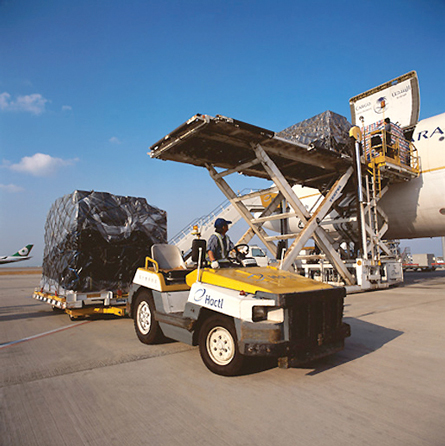After a tumultuous start to the year there was a collective sigh of relief as March cargo traffic figures appeared to underline theslide in air freight demand had at least been halted. It says much about the trepidation and uncertainty over the unfolding economic crisis that figures showing airfreight levels down more than a fifth year-on-year have been welcomed as positive news.
Air freight is one of the key economic barometres and has been on the slide since June 2008. By November IATA figures were showing double digits falls and air freight was down more than a fifth in December.
But this has since steadied and March IATAfigures showa 21.4% fall."It's not the end of the recession, but we may have found the floor," said IATA director general Giovanni Bisignani, on the release of the figures. It now expects freight to move "sideways" rather than down for the rest of the year, partly encouraged by surveys which show shippers are not as pessimistic as they were a few months ago.
 |
|---|
Figures from key cargo terminal operators show this trendcontinuing into April. Cargo tonnage at Hong Kong Air Cargo Terminals was 22.5% down on year-on-year, ahead of the 24.1% rate for the year-to-date.
If the industry is taking comfort from the cargo numbers, the passenger side and premium demand in particular is still a concern. Passenger traffic for March was 11% down IATA figures show, or 9%allowing for the Easter timing distortion, as demand shrank faster than airlines could cut capacity. It led to a five point drop inpassenger load factors.
Untold Story
Ulrich Schulte-Strathaus, secretary general of the Association of European Airlines - which reported passenger traffic down 9% in March but saw preliminary signs of a lower traffic fall more in line with capacity cuts for Aprilsays: "What the figures do not tell us is which passengers are not flying. Revenues are decreasing even faster than traffic volumes."
Susan Gurley, executive director of the Association of Corporate Travel Executives, says thegeneral outlook regarding the global economy and the business travel industry can best be described as "pensive". She notes during a recent ACTE-member convened global education conference in Washington, many industry leaders were cited as saying, "flat is the new up".
An earlier international survey of business travel managers indicated 71% would spend less on travel this year, with the heaviest cuts focusing on internal meetings. "We have now seen those cutbacks expanded to include employees attending professional conferences, with 75% of our constituents reporting restrictions, where none had been in place before," says Gurley
Further uncertainty has been added by the recent outbreak of the H1N1 influenza virus. Airline and travel bodies welcomed the World Health Organisation's leadership role in the global response to the outbreak andstrongly urged against unilateral national travel restrictions or border controls. "Fortunately there has been minimal impact on travel patterns to date," says Herdman. "We believe that passengers can be trusted to make informed decisions, provided there is open and transparent communication of accurate information."
Contingency Steps
Against this demand backdrop airlines have continued to take contingency action, tackling their labour costs and capacity requirements.Boeing in April revealed 60 aircraft deliveries in 2010/11 have been deferred into the future, and at least another 60 more deferrals are under discussion. But Boeing chief executive Jim McNerney adds there have not been a "meaningful" number of deferrals so far in 2009
Airbus chief salesman John Leahyadds so far the reality of cancellations is not as bad as some observers claim. "If you look at cancellations as a percentage of the backlog it really isn't that bad. You've seen some reschedulings, but you don't see that many cancellations, despite the headlines from people with their own vested interests in saying the sky is falling in."
Airbus though has cut planned A380 deliveries in 2009 from 18 to 14 aircraft after recent deferrals by Qantas and other early customers. Airbus chief executive Tom Enders does not expect A380 production to need a further downward adjustment, but says the impact of the slowdown on premium air travel is hurting the double decker. "The A380 is the flagship so has a lot of luxury on board, and that's where the trouble is right now." Enders adds current financing issues have also affected the A380 because it is such a high-value aircraft.
One signficant developmentwithin the aviation financial market, given several lease portfolios are on the market, is the sale of Allco Aviation to a consortium comprising Bravia Capital Partners of New York and HNA Group of China for an undisclosed amount. Allco says the aviation leasing portfolio contains 68 aircraft with another 21 aircraft on order.
The Bravia/HNA Consortium indicates the Allco acquisition presents an "opportunity to establish a strong footprint in the global aircraft financing and operating lease market." By accessing liquidity in both the Chinese and international markets, it plans to utilise the Allco platform and "rapidly grow the company over the next 12 to 36 months".
Look back at the mood and uncertainty of the sector in our earlier forecasts report
Source: Airline Business























